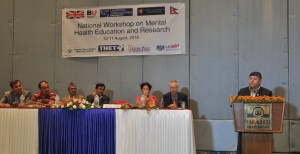 Today we completed the second day of training of health teachers, lecturers in nursng, public health and the like in Kathmandu. We called it the National Workshop on Mental Health Education & Research and this two-day workshop was held in a hotel in Kathmandu. It was organised by Tribhuvan University in collaboration with Bournemouth University and Liverpool John Moores University (LJMU). Mental health is high on the global agenda and want to raise the issue more in Nepal. The three universities are working together on an education intervention training Auxiliary Nurse Midwives in Nawalparasi on mental health issues and mental health promotion. The project is funded under the Health Partnership Scheme (HPS) from DfID and managed by THET (Tropical Health & Education Trust).
Today we completed the second day of training of health teachers, lecturers in nursng, public health and the like in Kathmandu. We called it the National Workshop on Mental Health Education & Research and this two-day workshop was held in a hotel in Kathmandu. It was organised by Tribhuvan University in collaboration with Bournemouth University and Liverpool John Moores University (LJMU). Mental health is high on the global agenda and want to raise the issue more in Nepal. The three universities are working together on an education intervention training Auxiliary Nurse Midwives in Nawalparasi on mental health issues and mental health promotion. The project is funded under the Health Partnership Scheme (HPS) from DfID and managed by THET (Tropical Health & Education Trust).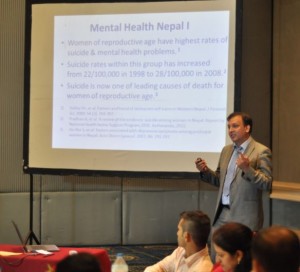
Key speakers on the first day of the workshop included: the VC of Tribhuvan University, Dr Gangalal Tuladhar MP and former Education Minister of Nepal, Dr Khem Karki (head of the Nepal Health Research Council), Dr Chandra Kala Sharma, Prof Shyam Krishna Maharjan and Prof Krishna Acharya.
This workshop is part of this capacity building process and the audience of largely university and college lecturers will take some of the learning back with them to improve the education of health workers in Nepal.
The second day of the workshop concentrateed on research methods for community-based projects such as this our THET funded one in the mental health field. Prof. Edwin van Teijlingen reminded the audience that it is important that novel mental health interventions like ours are properly evaluated, and that the people doing the evaluations have the appropriate rese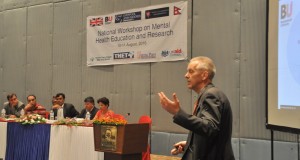 arch skills. The next group of UK volunteers are due to travel to Nepal in September.
arch skills. The next group of UK volunteers are due to travel to Nepal in September.
Prof. Edwin van Teijlingen
CMMPH
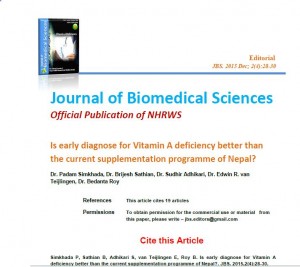
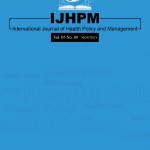 The Harding and Pritchard paper titled ‘UK and Twenty Comparable Countries GDP-Expenditure on Health 1980-2013: The Historic and Continued Low Priority of UK Health-Related Expenditure’, and published in the
The Harding and Pritchard paper titled ‘UK and Twenty Comparable Countries GDP-Expenditure on Health 1980-2013: The Historic and Continued Low Priority of UK Health-Related Expenditure’, and published in the 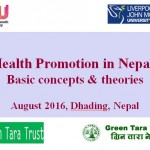
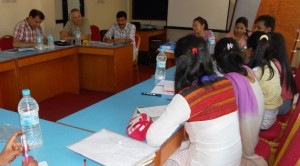
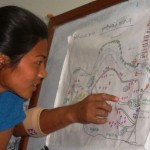
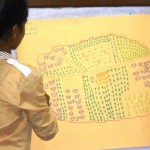
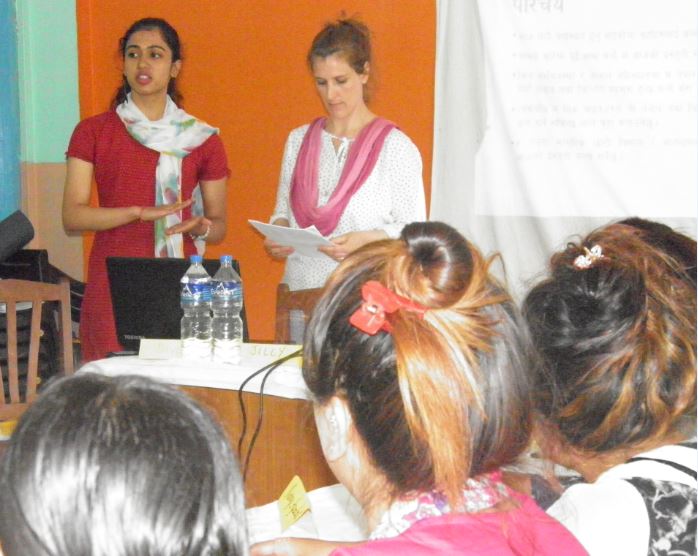

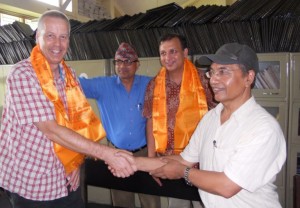
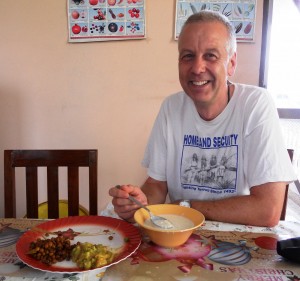
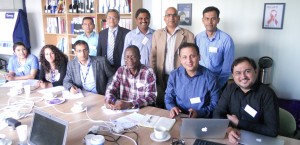
 Dr. Pramod Regmi in FHSS published his latest paper today in the South East Asia Journal of Public Health. The paper ‘Priority public health interventions and research agendas in post-earthquake Nepal’ is co-authored with researchers based in New Zealand, Nepal and the UK [1]. The authors reminds the readers that natural disasters cause huge damage to infrastructure, economies as well as population health. Nepal’s 2015 earthquake has multiple effects on population health and health services delivery. Many public health facilities, mostly health posts or sub-healthposts, were damaged or completely destroyed. Priority health services such as immunisation and antenatal care were also seriously affected.
Dr. Pramod Regmi in FHSS published his latest paper today in the South East Asia Journal of Public Health. The paper ‘Priority public health interventions and research agendas in post-earthquake Nepal’ is co-authored with researchers based in New Zealand, Nepal and the UK [1]. The authors reminds the readers that natural disasters cause huge damage to infrastructure, economies as well as population health. Nepal’s 2015 earthquake has multiple effects on population health and health services delivery. Many public health facilities, mostly health posts or sub-healthposts, were damaged or completely destroyed. Priority health services such as immunisation and antenatal care were also seriously affected.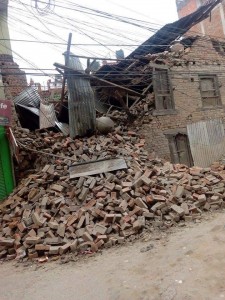
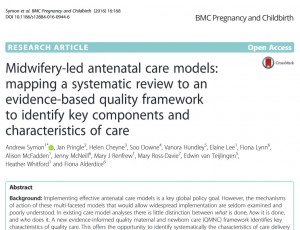
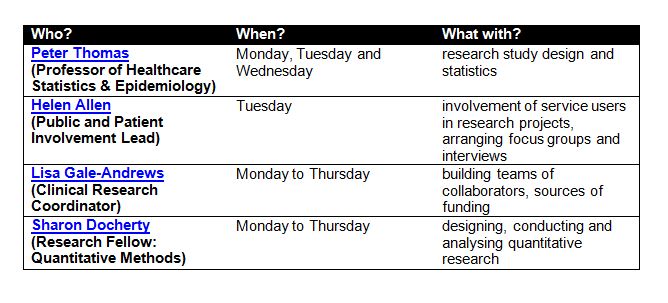

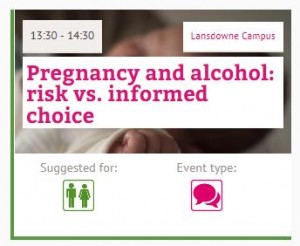
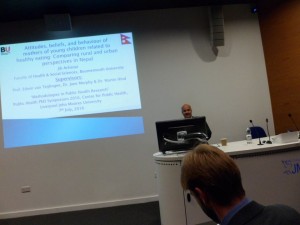

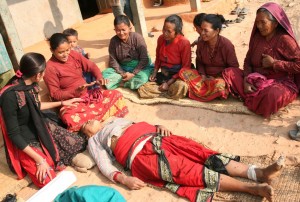











 Nursing Research REF Impact in Nepal
Nursing Research REF Impact in Nepal Fourth INRC Symposium: From Clinical Applications to Neuro-Inspired Computation
Fourth INRC Symposium: From Clinical Applications to Neuro-Inspired Computation ESRC Festival of Social Science 2025 – Reflecting back and looking ahead to 2026
ESRC Festival of Social Science 2025 – Reflecting back and looking ahead to 2026 3C Event: Research Culture, Community & Cookies – Tuesday 13 January 10-11am
3C Event: Research Culture, Community & Cookies – Tuesday 13 January 10-11am Dr. Chloe Casey on Sky News
Dr. Chloe Casey on Sky News ECR Funding Open Call: Research Culture & Community Grant – Application Deadline Friday 12 December
ECR Funding Open Call: Research Culture & Community Grant – Application Deadline Friday 12 December MSCA Postdoctoral Fellowships 2025 Call
MSCA Postdoctoral Fellowships 2025 Call ERC Advanced Grant 2025 Webinar
ERC Advanced Grant 2025 Webinar Horizon Europe Work Programme 2025 Published
Horizon Europe Work Programme 2025 Published Update on UKRO services
Update on UKRO services European research project exploring use of ‘virtual twins’ to better manage metabolic associated fatty liver disease
European research project exploring use of ‘virtual twins’ to better manage metabolic associated fatty liver disease